Let’s look at another example, one slightly more obvious: Davis McAlary’s campaign for city council.
http://www.youtube.com/watch?v=S2ggFMpnlPQ
McAlary is inspired to run for city council after a pothole wrecks his car in Episode 04 (“At The Foot of Canal Street”). The idea comes to him while drunk, like most of his ideas. His “friends” at the bar egg him on. Soon he’s pressing his parents for money, rolling down the street with strippers and taking meetings with New Orleans kingmaker Jacques Morial. He appears in a televised debate, promising to fix the city’s financial woes.
There’s little real chance McAlary will succeed – Treme hews too close to the bone to allow that. But he could coast on enough popularity to be dangerous. That’s just what a judge tells him over breakfast in Episode 7 (“Smoke My Peace Pipe”). In return for McAlary dropping out of the race, he offers a “get out of jail free” card: a business card with the judge’s cell phone number on it. McAlary grins, nods and takes it.
(Note: there was some ambiguity in the A.V. Club discussion on whether McAlary was legitimately dropping out. But considering that he spends the rest of the episode relaxing and taking care of friends, particularly Janette, I think it’s clear he’s stopped campaigning. Debate it if you like in the comments)
Davis McAlary is a joke candidate. He uses strippers to distribute campaign materials. He frames his issues around ways to make them lyrically memorable, like “Pot for Potholes.” Really, Davis? Out of all the money you’d get from legalizing and taxing pot, fixing potholes are your first priority? He has no real chance of winning. He seems to know it, too. But he’s not letting anyone else in on the joke. Anytime someone challenges him about his qualifications, he deflects the discussion.
MRS. McALARY: The question is, my darling boy: do you want people to take you as a serious individual or not?
DAVIS: Why would I do something that would violate the entire logic of my life as I’ve conducted it so far? […] But I also feel compelled to take exception to the idea that there’s nothing serious about what I can do with this. Jacques Morial says that I have a chance to talk about issues that nobody else is talking about.
MRS. McALARY: A Morial. What’s next?
AUNT MIMI: Get over it, Ramona.
MRS. McALARY: The point is, we finally have a chance to turn New Orleans around, now that certain elements are gone. Raising money from selling marijuana is not the way to do it.
DAVIS: Your carefully euphemised racist sentiments are duly noted, my darling mother. But even you might agree that the city needs every stream of revenue it can get. The city is broke and the city is broken. And it can’t stay broke and get fixed! It’s a contradiction in terms.
McAlary seems to genuinely want to change New Orleans. Being a self-centered ass, he goes about it in his own precious way. He records novelty songs – that aren’t very good, by the way: they don’t feature lyrics so much as they feature a litany of complaints set to righteous horn playing – and finds an excuse to hang out with strippers. He takes his talking points from better-informed advisors, like Jacques Morial (the Morials were one of the institutional families of New Orleans politics for generations: think the Daleys of Chicago or the Borgias of Rome). McAlary’s first issue comes to him because it wrecked his car. The subsequent issues – “Blackjack on the Track,” “Greased Palm Sunday” – seem calculated to stick in the mind, not to stand a chance of passing.
McAlary wants to change his city more than he wants to run for office.
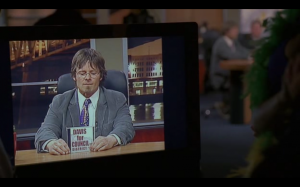
It could just be a roundabout way of getting his DJ gig back.
Is McAlary’s campaign a form of satire? Perhaps. It unites civility (a campaign for city council) with absurdity (legalizing pot, opening the doors on bribery) in order to address a social ill (the poverty and corruption of New Orleans). But it’s not a very good satire. The problem is that the absurdity McAlary uses contains its own set of social ills, which you have to acknowledge or deflect. McAlary (supposedly) wants to legalize and tax pot to repair the city’s infrastructure. Legalizing pot is monumentally unpopular, even in liberal New Orleans. McAlary (supposedly) wants bribery exchanges to take place on camera once a month. But the people who don’t take bribes won’t appreciate having aspersions cast on them, and the people who do take bribes won’t agree to this.
Perhaps this is why McAlary bows out at the first sign of real success. “Are you offering me a bribe?” he asks as the judge slides him a business card. The tone is one of delighted awe, like someone showing off the latest Apple gadget. McAlary was never offended by the amount of bribery in N’awrlins politics. He was offended because none of it was coming to him.
Maybe the most telling condemnation of McAlary’s attempts at satire came from Creighton Bernette in Episode 6.
BERNETTE: What is that?
SOFIA: It’s a Davis bumper sticker. He’s running for city council.
BERNETTE: Davis McAlary? Our Davis? Who’s teaching you boogie-woogie? That bozo’s running for council?
SOFIA (sings): ‘Vote for me / I ain’t fakin’ / I won’t lose my shit / Like Mayor Nagin.’
BERNETTE: Hey.
SOFIA: Mom’s not here!
BERNETTE: It’s not your language; this isn’t funny. What’s happening in New Orleans now is not a joke. We’re fighting for our lives – our way of life. People are dying, people are homeless, people are stuck all over the place; they can’t get back. Everything is not a joke all the time.
SOFIA: You mean like Krewe du Vieux?
BERNETTE: That’s political satire. It’s a long tradition. This is just wrong.
Why is Bernette – a man who’s about to parade through the Vieux Carre in front of a float featuring the mayor of his city pleasuring himself – so offended by McAlary? What makes dressing up as a mayoral sperm acceptable but running for City Council on a gag ticket “just wrong”?
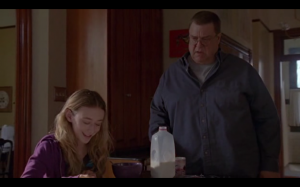
I don't want you endorsing that trash. Now go work on your sperm costume.
One possibility: Bernette is an asshole. Maybe he’s just an insecure boy, mad that someone else is playing his game. We have to give this some thought.
Another possibility: Bernette is pointing out the mote in someone else’s eye while ignoring the beam in his own. New Orleans has real problems, as Bernette points out to Sophia. A lot of these problems come from real jokers who got themselves elected – Ray Nagin, the Morials, etc. Bernette himself is an example of how popular someone from New Orleans can get by making a spectacle. Maybe Bernette fears that McAlary’s campaign will take off, getting attention outside the city. Were that to happen, that’d be another chapter in the growing story that the rest of America tells itself on Why New Orleans is Fucked Up. “McAlary? He’s that pothead that got elected to city council in New Orleans a few years ago, right?” Another excuse to write the city off.
A third possibility: the war between satirical styles.
I talked about Juvenalian satire regarding Bernette’s masturbatory float and the Krewe du Vieux. But the Krewe du Vieux is probably a better example of Horatian satire. Named after the poet Horatio, Horatian satire is meant to warmly mock the excesses of human nature. You’re meant to laugh at it. Nagin might be a grandstanding incompetent, but he did not literally masturbate while New Orleans sat under water. The point of depicting Nagin in such a way is to make him look self-satisfied and indulgent: to deflate him as a local hero. It’s a reminder that, for all the importance he assumed post-Katrina, he still is a ridiculous man.
To put it another way: the Krewe du Vieux float is not proposing a social change or pointing out an obvious institutional flaw. It’s taking someone down a peg. It’s “mocking the serious” – the sacred purpose of Krewe du Vieux. That’s Horatian satire.
Juvenalian satire, on the other hand, has bite to it. It’s supposed to make you angry. Now Davis McAlary makes people angry just by sharing a room with them, so that’s not saying much. But the issues he raises not only speak to New Orleans’ poverty, but to its institutional confusion as well. Why are the police investing so much time in shaking down people for smoking pot (as we saw with Delmond getting busted in Episode 2)? Couldn’t those resources be better used elsewhere? And why aren’t all political meetings conducted with open doors? What do the politicians have to hide? You can’t even rebut McAlary’s campaign without acknowledging that he’s raising good points.
A vote for “Pot for Potholes” is an acknowledgment that the War on Drugs does more harm than good. A vote against “Pot for Potheads” is a statement that cracked roads are a small price to pay for the right to bust young black men. Confronted with an alternative like that, you have to get angry. And that’s Juvenalian satire for you.
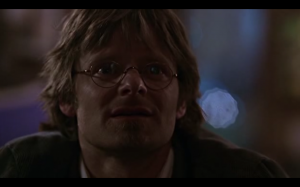
Change you really shouldn't believe in.
Juvenal and Horatio never went to war in real life, probably because they lived a century apart. But the forms of satire which bear their name are distinctly different. Horatio’s is the shared laugh of The Simpsons; Juvenal’s is the biting sarcasm of Orwell. It can be discomfiting to find one when you expected the other. This is why Bernette can’t laugh at McAlary’s run for city council: because he doesn’t use humor as a weapon. When Bernette wants to say “fuck you” to someone, he says just that. And this is why McAlary won’t back down in the face of his peers’ or his parents’ disbelief: because, to make Juvenalian satire work, you have to keep your straight face until the end. He backs down as soon as somebody takes him seriously: Judge Williams, treating him as a real threat to the ticket.
New Orleans – and Treme – take their satire very seriously. The only question for the coming episodes: which kind will it be?
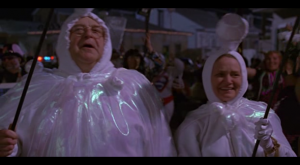
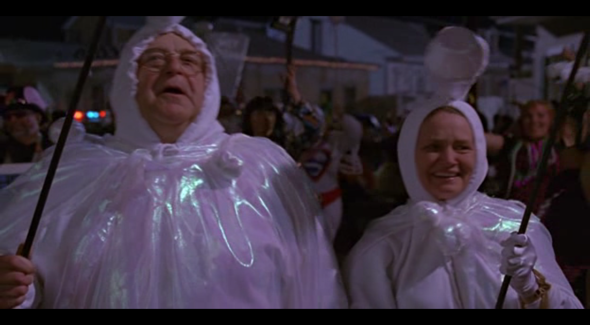
It wasn’t “Cato abstains;” it was “K-Doe abstains”. They were in the Mother-in-Law Lounge, see here:
http://www.usatoday.com/life/music/news/2007-05-20-kdoe_N.htm
Man, I am an ignorant-ass white boy. Fixed.
may i suggest nola.com’s treme covering, especially the “Treme explained” weekly column? Not quite Mad-Men-Footnotes-for-Treme, but pretty useful
A few things: “Lady” in the Krewe du Vieux meeting is Becky Allen – one of New Orleans’ most popular comedic actresses. Yes, the float of Nagin masturbating did exist – and there were people dressed like sperm – among other things. Creighton wasn’t putting his daughter in harm’s way and remember that in the end, the whole family was parading as swimmers. Krewe du Vieux is good dirty fun for all ages. I disagree about the planning aspect being the “unfunny” part that served as a spoiler – the point wasn’t to shock with the float at the end, it was the culmanation of the process. Treme is about letting the rest of you experience aspects of New Orleans that you never would otherwise. In New Orleans, outrage at injustice and floats of masturbating mayors are not mutually exclusive.